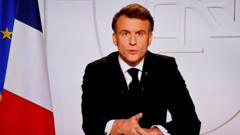The gathering in Brussels marks a significant moment for European defense as leaders aim to solidify strategies amid rising geopolitical tensions.
### Europe Faces a Crucial Crossroads, Macron Declares at Defense Summit

### Europe Faces a Crucial Crossroads, Macron Declares at Defense Summit
As European leaders convene in Brussels, President Macron warns of a pivotal moment for the continent's security.
In light of evolving global security dynamics, French President Emmanuel Macron has raised alarms, indicating that Europe stands at a critical turning point in its history.
European leaders have assembled in Brussels for a pivotal council focused on defense, with Macron emphasizing the urgency of this moment in history. The discussions are expected to center around enhancing military capabilities and how the EU can bolster its support for Ukraine, especially following recent discord regarding U.S. aid to Ukraine.
This tension escalated last week with a contentious meeting between U.S. President Trump and Ukrainian President Volodymyr Zelensky, sowing seeds of doubt about the U.S.'s commitment to Europe's defense. With the recent decision by Washington to halt intelligence sharing with Ukraine, European leaders expressed growing anxiety about their reliance on American support for security.
In response to these developments, Macron suggested that France could extend its nuclear deterrent to other European nations, an idea echoed by Friedrich Merz, projected to be Germany's future chancellor, advocating for broader nuclear sharing discussions. "We face a clear and present danger on a scale unseen in our lifetime," underscored European Commission President, Ursula von der Leyen, calling on the EU to "meet the moment" and fortify its defensive capabilities.
Earlier this week, von der Leyen unveiled an ambitious defense initiative, dubbed ReArm Europe, proposing substantial increases in defense spending to support Ukraine and enhance European self-sufficiency in security matters. This initiative would enable countries to raise national deficits to accommodate increased defense budgets, provide loans for significant defense projects, and allow redirection of funds previously allocated for regional cohesion to defense expenditures.
The ReArm Europe plan could potentially unlock up to €800 billion ($860 billion) in defense spending. As European leaders express strong support for rapid, decisive action concerning security, reactions vary; some, like Polish Prime Minister Donald Tusk, describe it as a monumental shift, while others, like Slovak Prime Minister Robert Fico, express skepticism about the approach.
Despite some leaders' reluctance, Macron has pursued dialogue aimed at unity, even inviting Hungarian Prime Minister Viktor Orban for discussions in Paris. Orban has consistently resisted EU support for Ukraine and recently articulated a divisive stance on the intersection of EU and U.S. priorities regarding the conflict.
In a poignant address to the nation, Macron conveyed France's intention to prepare in case of diminished U.S. support, stating, “We must unite to defend ourselves,” and emphasizing that Europe's future should not hinge solely on Washington or Moscow. Following this summit, Macron plans to convene a meeting of European military leaders, aiming to define Europe’s path forward in safeguarding its interests.
As tensions mount in the context of the Ukraine conflict and the broader geopolitical landscape, European leaders face an urgent challenge: to create a robust defense framework capable of withstanding external pressures and ensuring the continent’s security in an increasingly uncertain future.
European leaders have assembled in Brussels for a pivotal council focused on defense, with Macron emphasizing the urgency of this moment in history. The discussions are expected to center around enhancing military capabilities and how the EU can bolster its support for Ukraine, especially following recent discord regarding U.S. aid to Ukraine.
This tension escalated last week with a contentious meeting between U.S. President Trump and Ukrainian President Volodymyr Zelensky, sowing seeds of doubt about the U.S.'s commitment to Europe's defense. With the recent decision by Washington to halt intelligence sharing with Ukraine, European leaders expressed growing anxiety about their reliance on American support for security.
In response to these developments, Macron suggested that France could extend its nuclear deterrent to other European nations, an idea echoed by Friedrich Merz, projected to be Germany's future chancellor, advocating for broader nuclear sharing discussions. "We face a clear and present danger on a scale unseen in our lifetime," underscored European Commission President, Ursula von der Leyen, calling on the EU to "meet the moment" and fortify its defensive capabilities.
Earlier this week, von der Leyen unveiled an ambitious defense initiative, dubbed ReArm Europe, proposing substantial increases in defense spending to support Ukraine and enhance European self-sufficiency in security matters. This initiative would enable countries to raise national deficits to accommodate increased defense budgets, provide loans for significant defense projects, and allow redirection of funds previously allocated for regional cohesion to defense expenditures.
The ReArm Europe plan could potentially unlock up to €800 billion ($860 billion) in defense spending. As European leaders express strong support for rapid, decisive action concerning security, reactions vary; some, like Polish Prime Minister Donald Tusk, describe it as a monumental shift, while others, like Slovak Prime Minister Robert Fico, express skepticism about the approach.
Despite some leaders' reluctance, Macron has pursued dialogue aimed at unity, even inviting Hungarian Prime Minister Viktor Orban for discussions in Paris. Orban has consistently resisted EU support for Ukraine and recently articulated a divisive stance on the intersection of EU and U.S. priorities regarding the conflict.
In a poignant address to the nation, Macron conveyed France's intention to prepare in case of diminished U.S. support, stating, “We must unite to defend ourselves,” and emphasizing that Europe's future should not hinge solely on Washington or Moscow. Following this summit, Macron plans to convene a meeting of European military leaders, aiming to define Europe’s path forward in safeguarding its interests.
As tensions mount in the context of the Ukraine conflict and the broader geopolitical landscape, European leaders face an urgent challenge: to create a robust defense framework capable of withstanding external pressures and ensuring the continent’s security in an increasingly uncertain future.




















